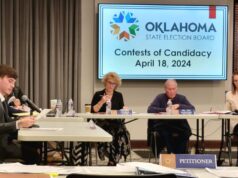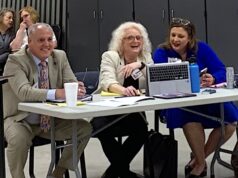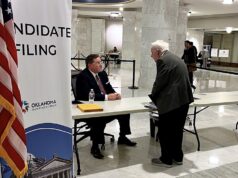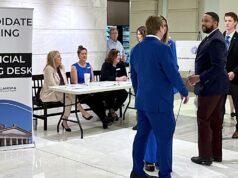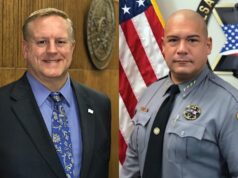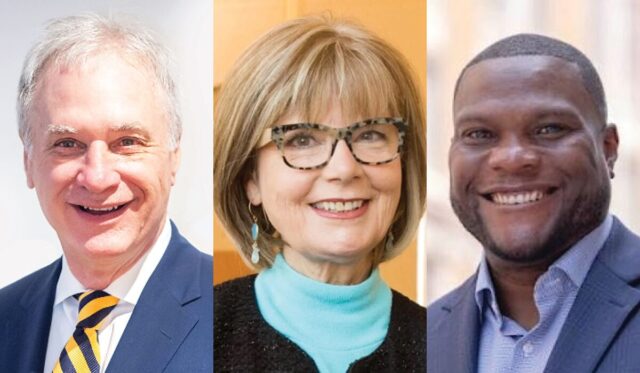

While the official candidate filing period for this year’s Tulsa mayor race is June 10-12, Rep. Monroe Nichols (D-Tulsa), Councilman Jayme Fowler and County Commissioner Karen Keith have already been active in pursuit of the city’s top office.
With Mayor G.T. Bynum not seeking a third term, Fowler, Keith and Nichols all launched campaigns, started fundraising and began hosting events last year in an effort to become Tulsa’s 41st mayor. As they have embarked upon the campaign trail, each has offered slightly different visions for the future of Tulsa.
Throughout the race so far, addressing homelessness and housing needs has been a key topic. While all agree that more housing is needed, one candidate has voiced their support for increasing sweeps of encampments where homeless individuals live.
State-tribal relations have also taken center stage, as all three Tulsa mayoral candidates have voiced their support for working with tribes as partners. The most ambitious idea, if implemented, would see tribal courts brought to Tulsa, the largest city in the United States within Indian Country.
Nichols, Fowler, and Keith launch early campaigns
Nichols is an alumnus of the University of Tulsa and a former college football player. After graduating in 2006, he started his career in former Tulsa Mayor Kathy Taylor’s office. After a failed run for the Oklahoma House of Representatives in 2008, Nichols was elected to represent House District 72 in 2016.
If elected, Nichols would become Tulsa’s first Black mayor. The history of Tulsa’s Black community has gained national prominence owing to renewed focus on the Tulsa Race Massacre of 1921. Tulsa could join other Oklahoma towns who have elected their first Black mayor in the 2020s. In 2020, Muskogee elected its first Black mayor, Marlon Coleman, and Edmond elected its first Black mayor, Darrell Davis, in 2021.
Fowler is currently the only candidate running who grew up in Tulsa, having graduated from Memorial High School. An alumnus of the University of Arkansas, he has worked as a managing partner at Oak Creek Private Wealth.
Fowler was first elected to represent District 9 on the Tulsa City Council in 2020. Notably, District 9 was also Bynum’s council seat before he ran for mayor.
Keith is an alumnae of Oklahoma State University who spent 26 years working in broadcasting, including 21 years at KJRH. After her retirement from broadcast journalism, she has served as the Tulsa County commissioner for District 2 since 2008.
In 2002, she worked for former Tulsa Mayor Bill LaFortune on the Vision 2025 initiative.
Nichols, Fowler and Keith were each up for reelection to their current offices this year, meaning two of the three will vacate public office later this year.
Nichols was the first candidate to announce his campaign in July, quickly followed by Keith in August. Fowler announced his campaign in September. The early campaign launches allowed candidates to begin fundraising for the upcoming election, which is scheduled for Aug. 27. If no candidate receives a majority of voter support that day, a runoff is scheduled for Nov. 5.
Tulsa mayoral candidates outline top three priorities
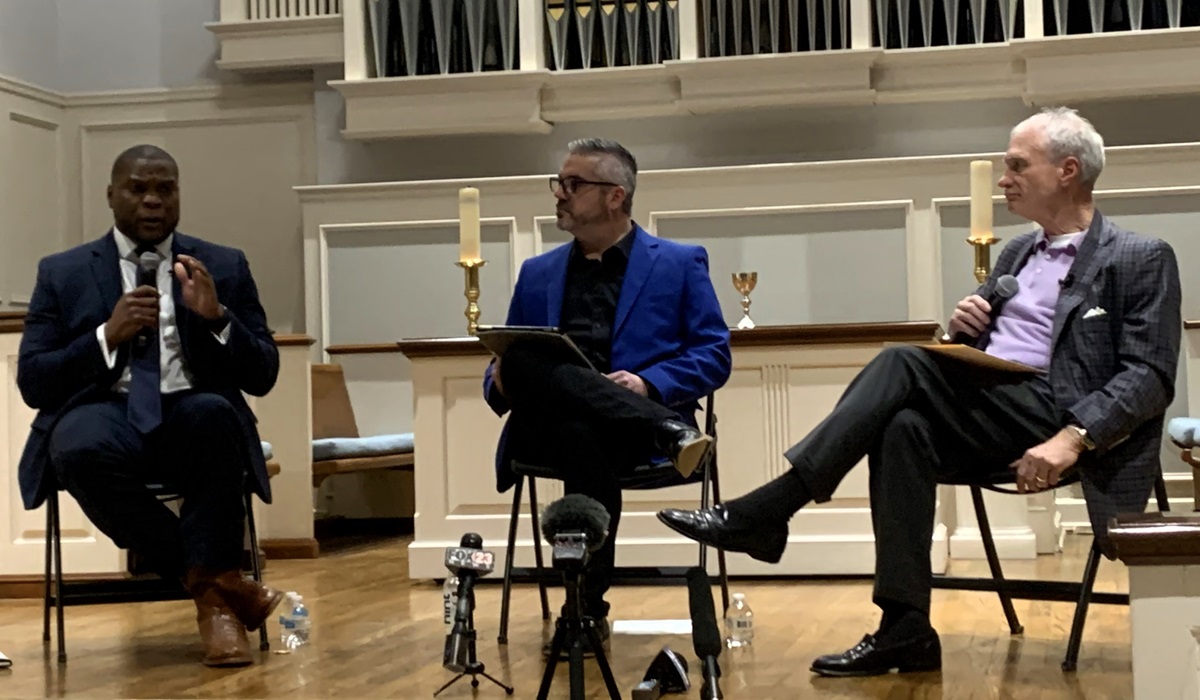
Nichols and Fowler both appeared at a town hall last month to discuss issues facing the city. Karen Keith, who was ill for the town hall, provided her views on issues facing the city in a phone interview after the event.
Asked to name the biggest issues facing Tulsa, Nichols outlined homelessness, education and public safety as the top three concerns he has heard on the campaign trail. He said those three things were underpinned by the question of “how united of a city are we going to be” and how to cooperate with tribal governments.
“Frankly, Tulsa is the biggest city in the country that is all encompassed in Indian reservations,” Nichols said, “and we’ve got to co-govern toward the future.”
Fowler outlined continuing the “3H Task Force initiatives,” which focus on homelessness, affordable housing and mental health. He stressed the need for more mental health facilities in Tulsa.
“A big part of homelessness is mental health, and often times homelessness is just a symptom,” Fowler said. “Mental issues are a big, big, big driver of that.”
Keith outlined her priorities as “great schools, well-maintained streets” and addressing homelessness. She expressed her support for local control of all school districts in Tulsa and promised to have an official focus on supporting after-school programs “in areas around our city experiencing the most challenges.”
She also applauded the appointment of Tulsa Public Schools Superintendent Ebony Johnson.
“She and her team have been hard at work since day one,” she said, “Twelve Tulsa schools are no longer on the federal improvement list.”
Housing, shelters discussed as response to homelessness
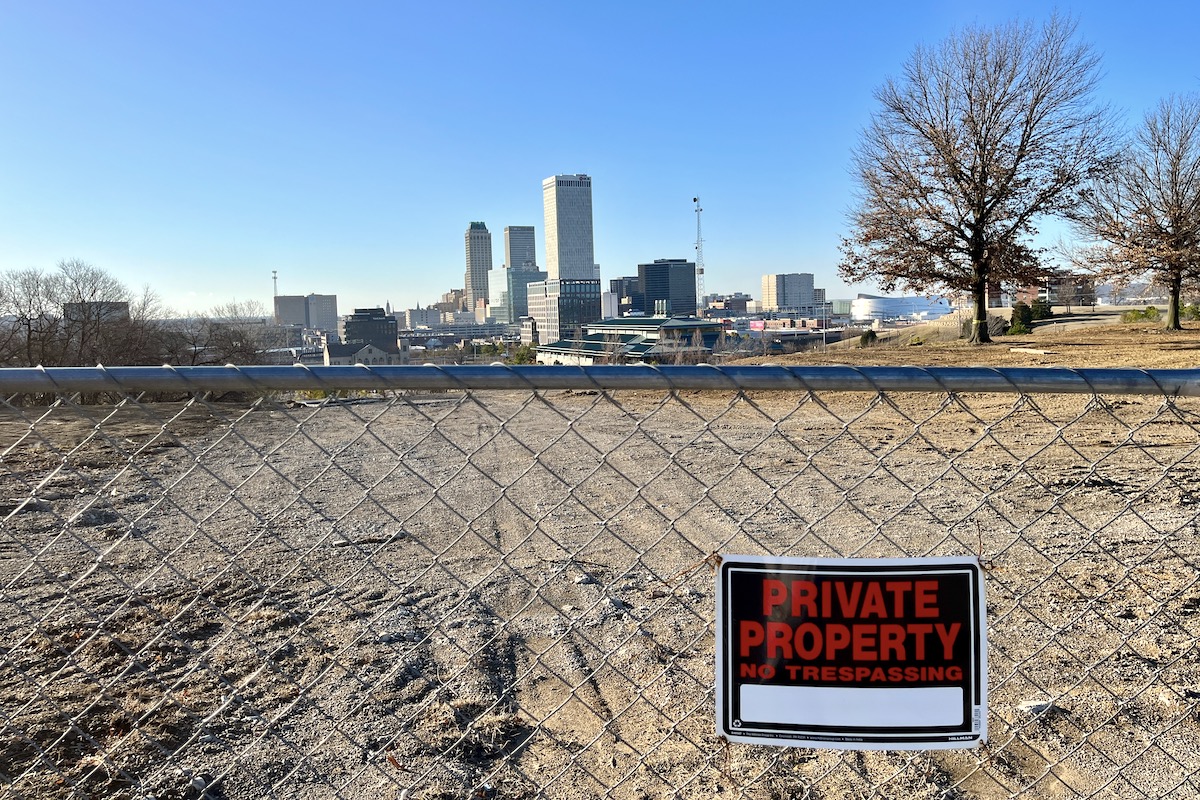
The topics of housing and homelessness gained much attention at the Jan. 25 town hall held at Southminster Presbyterian Church.
Nichols said the mayor’s office should take up homelessness as a priority and that the city should reform its permitting system for constructing new housing.
“[Housing developers] said the permitting process at the city is very cumbersome and difficult,” he said. “The difference is the production of between 1,500 and 2,200 additional units every year.”
Nichols also pointed out that affordable public housing makes communities safer and argued that it is more dangerous to not house people.
“Those communities where you put people in a better situation, they don’t get more dangerous. We’re doing it the dangerous way now,” Nichols said. “Walk outside, it’s in your backyard, and by the way probably your front yard, too.”
Fowler noted the “myriad” of reasons people experience homelessness.
“No. 1, they’re mentally ill. No. 2, they’ve embraced homelessness as a lifestyle. No. 3, if you’re a female, you really don’t want to go down to a shelter because of possible physical violence,” he said.
Fowler went on to advocate for a low-access shelter that would be open to any Tulsan needing shelter.
“No one in our community is the child of a lesser god. No one should ever have to live out in the street,” Fowler said.
But Fowler also argued for more sweeps of homeless encampments, citing an anecdote wherein he told the city’s asset management division to sweep encampments near his home around 26th Street and Harvard Avenue.
“We need to have those swept every day, and we need to let those folks know that, you know what, that’s no longer a place for them to live,” Fowler said. “And they went to a Monday-through-Friday sweep.”
Fowler struck a different tone from Nichols on the topic of affordable housing, citing public housing failures in other major cities.
“I’ve seen cities like Chicago,” Fowler said, “and you literally see city blocks that have been bulldozed because of poor choices as far as public housing.”
Fowler touted efforts in the city converting public housing into mixed-used development and criticized Tulsa’s current public housing.
“Here in the city of Tulsa, we have a high concentration of public housing. It doesn’t work. It never did,” Fowler said.
Keith also supported cutting “red tape” to encourage developers to build more affordable housing and touted the county’s creation of two “tiny home villages” with $500,000 of federal American Rescue Plan Act funds as part of her homelessness strategy.
“I am promoting and supporting these efforts as at least one solution to get individuals off the streets and into permanent housing,” Keith said.
On public housing, Keith discussed taking part in the area’s Point in Time count to measure the homeless population in the county.
“I met individuals last year who were carrying housing vouchers, and they just had no place to take them,” Keith said. “So definitely, in this affordable housing space, we’ve got to remedy it.”
Views on tribal issues vary
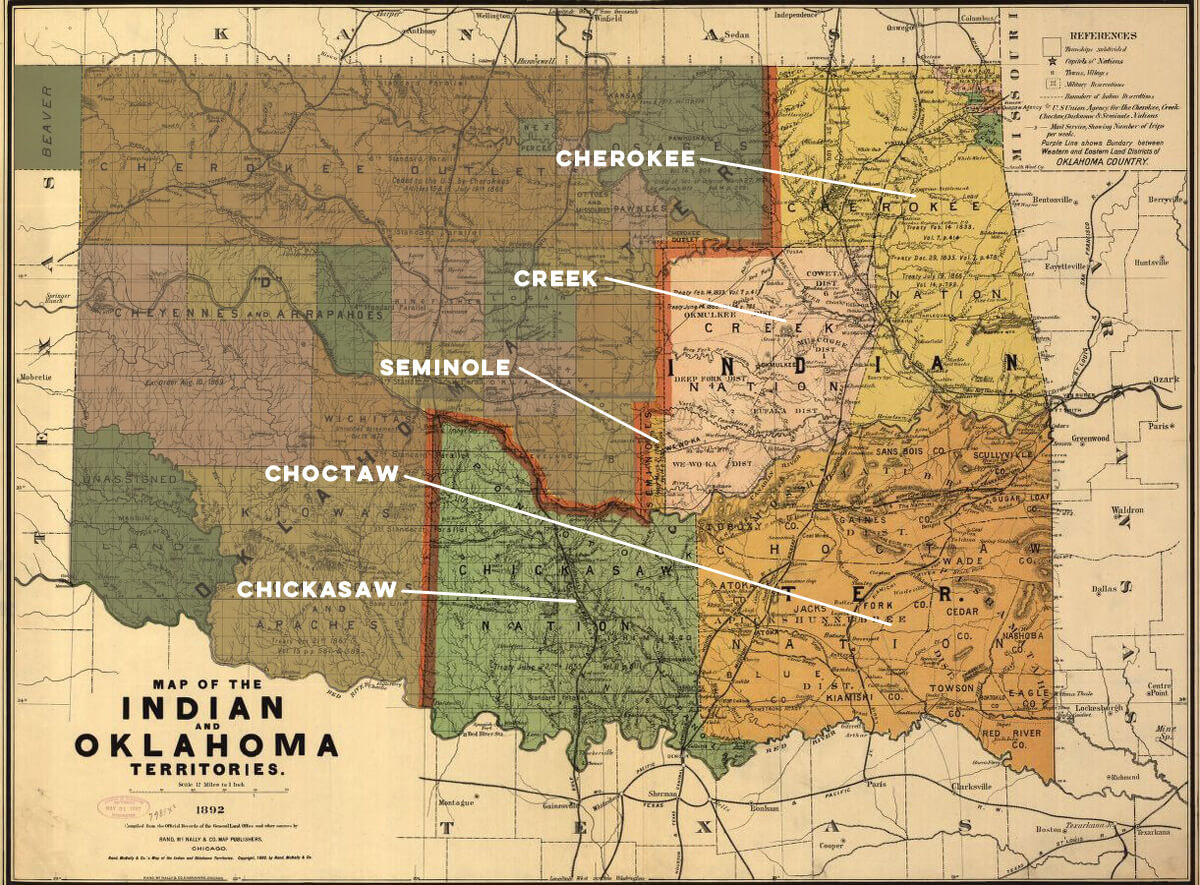
Toward the end of the Jan. 25 town hall, event organizers allowed audience questions for the Tulsa mayoral candidates. The first questioner wanted to know the candidates’ views on tribal issues.
Fowler touted his experience serving on the city’s Tribal Relations Committee.
“These are vitally important people in our society, and they should be honored and treasured,” he said.
Fowler emphasized the millions of dollars in investments that tribes bring to Tulsa, and he promised to treat tribal governments with “courtesy and respect” while giving them a “seat at the table.”
Nichols discussed frustrations with Gov. Kevin Stitt’s approach to tribal relations and emphasized “the importance for us to not just respect, but to co-govern, with our tribal partners.”
He also criticized the City of Tulsa’s ongoing and past litigation involving tribal jurisdiction.
“I want to see the city work those (post-McGirt issues) out not in a courtroom, but together,” Nichols said, before advocating for the city adding a director of tribal policy and partnerships.
Keith emphasized her good relationship with tribal governments while working as Tulsa County commissioner and said she is “grateful” to the Cherokee Nation for opting into the federal summer lunch program, which was recently rejected Stitt.
“The Cherokees are really (coming) to the rescue on these funds for the summer lunch program that our state declined to take advantage of,” Keith said.
Keith also noted that Tulsa County was in need of a new courthouse and expressed support for any new courthouse location including space for tribal courts of the Cherokee and Muscogee nations.
“I’ve had conversations with our tribal leaders asking if they would have an interest in putting a tribal court in alongside our (county) court,” Keith said.
While she noted that including tribal courts in a new Tulsa County Courthouse would present challenges, she argued that having one courthouse would be easier for citizens to navigate. Still, she said tribal leaders have told her that they prefer to have tribal courts located within their reservations, which could make finding an appropriate location more difficult.
Arkansas River water quality a concern
On the topic of environmental issues in Tulsa, Nichols argued that Tulsans want more transparency.
He singled out questions about water quality in the Arkansas River. The construction of Zinc Lake on the Arkansas River has spurred concern about the safety of the lake, including concerns about bacteria in the river and oil seepage from the HF Sinclair refinery in west Tulsa.
“We don’t know as we begin to dam up the lake in the middle of the Arkansas River how safe the water is,” Nichols said. “If we take our families out there, are we going to be in a position where we might put them in harm’s way?”
Fowler argued for stopping illegal dumping and preventing water pollution.
“Our waters need to be always vibrant, and they need to be pristine,” he said. “That’s just simply nonnegotiable.”
He advocated a partnership with the federal Environmental Protection Agency, setting water standards and rerouting railroads that carry hazardous materials.
Keith stressed the importance of addressing both the water quality in the Arkansas River and removing the butane transloading station that operates just northeast of downtown.
Regarding Zinc Lake, Keith said water quality testing is set to begin in about six months and that once the project is complete, results would be posted with “on-site messaging” for citizens.
Regarding the butane transloading station near downtown Tulsa, she said it poses a threat to “historic Greenwood, our downtown, and the OSU campus.” Any solution would require federal cooperation, Keith said.
“Since this is a short-line rail, this issue will require help from the federal government and our congressional delegation,” Keith said.
Follow @NonDocMedia on:
Facebook | X | Text or Email
Candidates: Race Massacre descendants have role in investigations
When asked about the transparency of the Tulsa Race Massacre investigations, Fowler shared how he first learned about the Tulsa Race Massacre while living in Charlotte, North Carolina, and reading The Economist in 1999. Despite growing up in Tulsa and graduating from Memorial High School, he said he did not learn about the massacre until adulthood.
He then pushed back on the notion that the current investigation lacked transparency while vowing full transparency and “closure” if elected mayor.
“I think, quite frankly, there has been transparency on it. The mayor has done a very good job,” Fowler said. “He could have done better.”
Nichols, chairman of the Oklahoma Legislative Black Caucus, voiced his frustration with how history is taught in Oklahoma.
“So many people grew up in this community not even knowing that this had happened,” Nichols said.
He went on to emphasize that descendants of victims of the massacre should be in the “driver’s seat” as the city investigates the massacre.
“Partnerships move at the speed of trust,” Nichols said.
Keith emphasized the importance of remembering the history of Tulsa.
“We can’t forget our history. Our city’s history and its scars were covered with a Band-Aid for far too long,” Keith said. “For proper healing and closure to take place, the city, in consultation with the northside community, should maybe explore other sites that may provide more answers and closure.”
Keith also argued that leaders need focus on how the city will be remembered moving forward.
“At the end of the day, our city has to move forward, and I believe that investing in jobs, housing, education and infrastructure will create long-term meaningful impacts in this part of our community that was harmed,” Keith said. “It’s what our city does next in the wake of this tragedy that will determine how we’re remembered in the years to come.”









